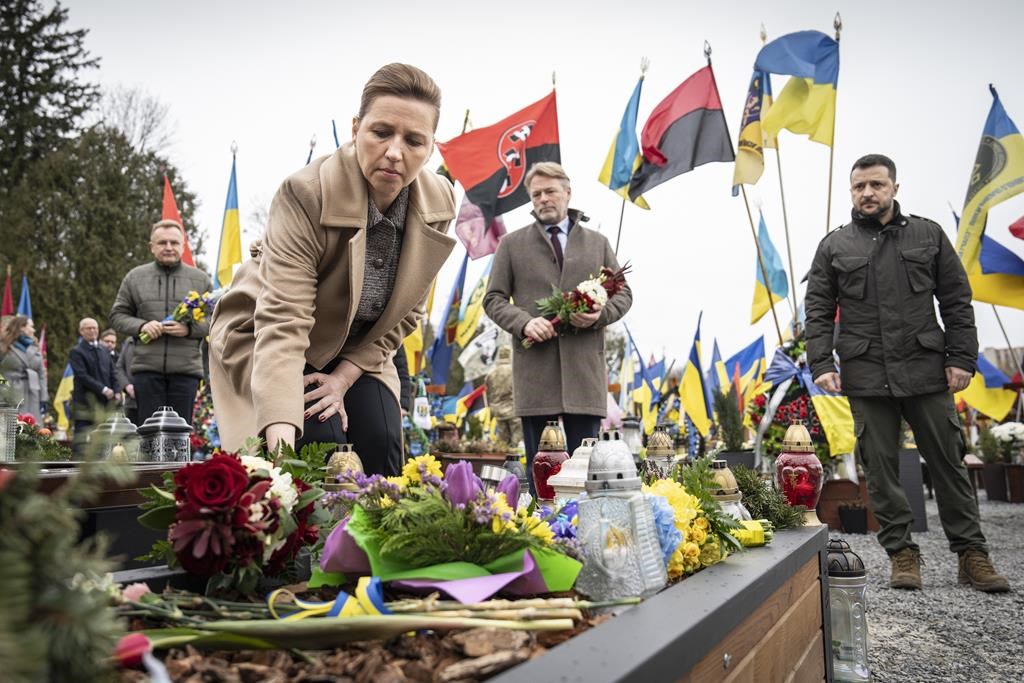In Ukraine, Schumer challenges Speaker Johnson to ‘rise to the occasion’ and pass more US aid

Posted Feb 23, 2024 03:01:43 AM.
Last Updated Feb 23, 2024 03:15:50 PM.
WASHINGTON — Standing on Ukrainian soil in a surprise visit with President Volodymyr Zelenskyy, Senate Majority Leader Chuck Schumer challenged House Speaker Mike Johnson to take up a $95 billion national security package that includes aid for the country as it battles Russia’s invasion.
“The weight of history is on his shoulders,” Schumer told reporters in Lviv on Friday after he and four other Democratic senators met Zelenskyy and other officials. “If he turns his back on history, he will regret it in future years.”
Schumer said he was in Ukraine “to talk directly to Speaker Johnson,” as the aid bill passed by the Senate has stalled in the House and Ukrainian forces run dangerously low on ammunition and weaponry.
“Speaker Johnson, history is looking down upon you, looking over your shoulder,” Schumer said. “Rise to the occasion.”
The Senate passage of the aid package, with $60 billion for Ukraine, came last week after the collapse of a broader framework that would have combined the aid with changes to American border policies. The Senate quickly moved ahead with just the foreign aid portion, passing it on a 70-29 vote, with 22 Republicans in support.
But the path ahead in the House is far from certain. Johnson, R-La., has not yet put forward a plan for passing it in the House.
GOP opponents of aiding Ukraine are a vocal faction in the House, where Republicans have narrow control and former President Donald Trump, the front-runner for the GOP presidential nomination, holds more sway. Trump has opposed the aid package and urged Republicans to vote against it.
Some House Republicans have threatened to try to remove Johnson from his job if he puts the aid package up for a vote. He has said he “ won’t be rushed ” into a decision.
House Republicans have floated possible ways to push the aid to passage, including by scaling it back, but no plan has so far emerged. It remains unclear how Johnson – only months into the job after replacing ousted Kevin McCarthy as speaker — will navigate the deep divisions within his party.
Republicans who oppose the aid say that the money is better spent in the U.S. and it should be paired with legislation to curtail record numbers of crossings at the southern border. They rejected the proposed Senate compromise on border policy, saying it was not tough enough, and some of them want to see the House try again to tackle that issue before moving to the national security package.
Schumer said in Ukraine that Johnson should not “let blind obeisance to Donald Trump prohibit you or your colleagues from voting for this package.”
He said the delegation had come also to “tell the Ukrainian people we are with you” and to tell European countries that the United States is not abandoning them.
Ukrainian officials have told the delegation that they will lose the war without additional U.S. aid, Schumer said. The group visited a cemetery and saw freshly dug graves, “and we saw the faces of the brave men and women who had lost their lives — some of whom had lost their lives, inevitably, because they didn’t have all the ammunition that they needed.”
Also on the trip are Sens. Richard Blumenthal of Connecticut, Michael Bennet of Colorado, Maggie Hassan of New Hampshire and Jack Reed of Rhode Island. Reed is the chairman of the Senate Armed Services Committee.
Schumer’s trip comes at a perilous time for Ukraine. Zelenskyy has said that delays in aid from the U.S. and other Western countries are creating an opening for Russia to make advances on the battlefield.
The visit comes days after senators and House lawmakers from both parties traveled to the Munich Security Conference to try to assuage European leaders, including Zelenskyy, who are closely watching the U.S. developments. The conference coincided with Ukraine withdrawing troops from the eastern city of Avdiivka after months of intense combat.
In the Senate, a group of Republicans opposed to the foreign aid kept the chamber open all night to rail against it before the final vote. Some echoed Russian President Vladimir Putin in calling for a negotiated end to the war.
Sen. J.D. Vance, R-Ohio, part of the increasingly isolationist wing of the GOP, traveled to the Munich conference to make his case. He countered Zelenskyy’s pleas by saying that additional money wouldn’t “fundamentally change the reality” on the ground.
“Can we send the level of weaponry we’ve sent for the last 18 months?” Vance asked. “We simply cannot. No matter how many checks the U.S. Congress writes, we are limited there.”
In an interview with The Associated Press before his visit, Schumer said opposition to the aid “may be the view of Donald Trump and some of the hard-right zealots. But it is not the view of the American people, and I don’t think it’s the view of the majority of people in the House or Senate.”
Schumer said he is “greatly worried” about what could happen if Congress doesn’t act.
“They’re hurting,” he said of Ukraine. “And I think by us being there, we’re giving them strength and giving them hope that America is still fighting for them.”
Mary Clare Jalonick, The Associated Press








